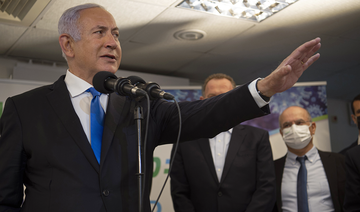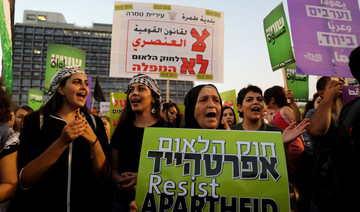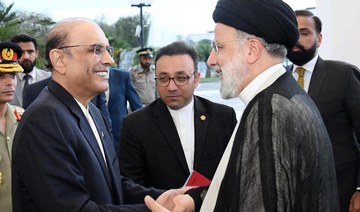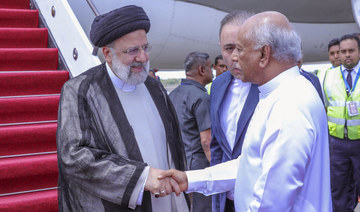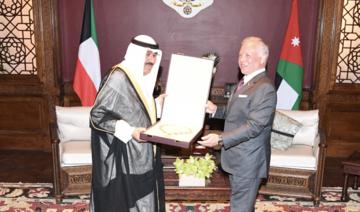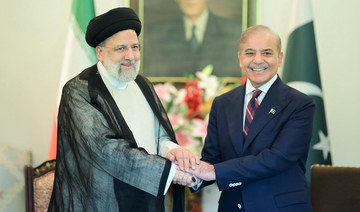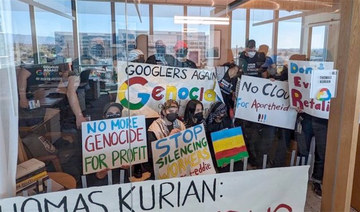JERUSALEM: An Arab Israeli lawmaker who quit the ruling coalition said Sunday that she was returning to Prime Minister Naftali Bennett’s 60-member alliance, ending a crisis that lasted just a few days.
Ghaida Rinawie Zoabi said Thursday that she was quitting Bennett’s coalition, leaving it with with just 59 members in Israel’s 120-seat parliament. She cited the government’s hard-line policies in Jerusalem and West Bank settlement construction that she said have alienated her constituents, fellow Palestinian citizens of Israel.
Two other legislators from Bennett’s own party have already broken ranks and joined the opposition, headed by former leader Benjamin Netanyahu. Rinawie Zoabi’s departure had raised the possibility of new parliamentary elections less than a year after Bennett’s broad coalition government took office. But even with a 60-member coalition that’s deadlocked with the opposition, passing legislation will remain difficult.
Recent Israeli-Palestinian tensions, set off by several deadly Palestinian attacks against Israel and Israeli arrest raids in the occupied West Bank, and fueled by repeated clashes between Israeli police and Palestinian protesters at a flashpoint Jerusalem holy site, have shaken the coalition’s stability.
But on Sunday Rinawie Zoabi reversed course, saying that her main concern was securing “achievements for the needs of Arab society” in Israel, and preventing an ultranationalist extremist in the opposition from becoming the next minister in charge of police.
She made the announcement of her return to the coalition’s ranks after meeting with Foreign Minister Yair Lapid, who wrote on Twitter that the two had “an open and reasonable conversation about the real needs of Arab society” and put aside their disagreements.
As leader of a small nationalist party Bennett heads an unwieldy coalition of eight diverse parties — from dovish factions supporting Palestinian statehood to ultranationalists and, for the first time in Israel’s history, an Islamist Arab party. They joined forces in June after four consecutive deadlocked elections with the aim of ousting longtime prime minister Benjamin Netanyahu, who is on trial for corruption.
As part of their union, the parties agreed to set aside divisive issues, like Palestinian statehood, and focus instead on topics such as the coronavirus pandemic and the economy. Despite its internal divisions, it has managed to pass a budget, navigate the pandemic and strengthen relations with both the Biden administration and Israel’s Arab allies.
Israeli Arab lawmaker rejoins coalition days after quitting
https://arab.news/4kkqt
Israeli Arab lawmaker rejoins coalition days after quitting
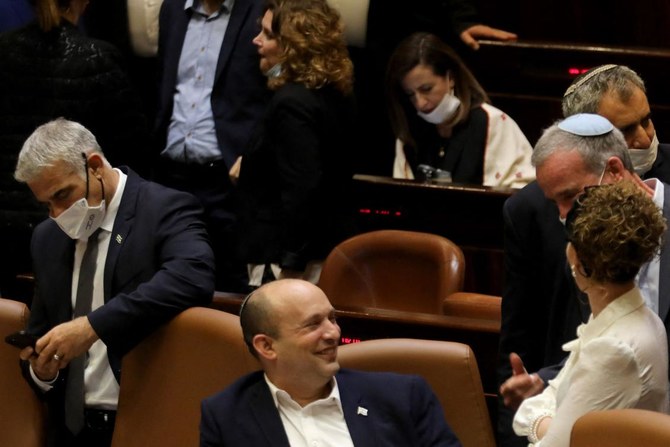
- Rinawie Zoabi’s departure had raised the possibility of new parliamentary elections less than a year after Bennett’s broad coalition government took office
- But on Sunday Rinawie Zoabi reversed course, saying that her main concern was securing ‘achievements for the needs of Arab society’ in Israel
Iran cuts Syria presence after strikes blamed on Israel: monitor
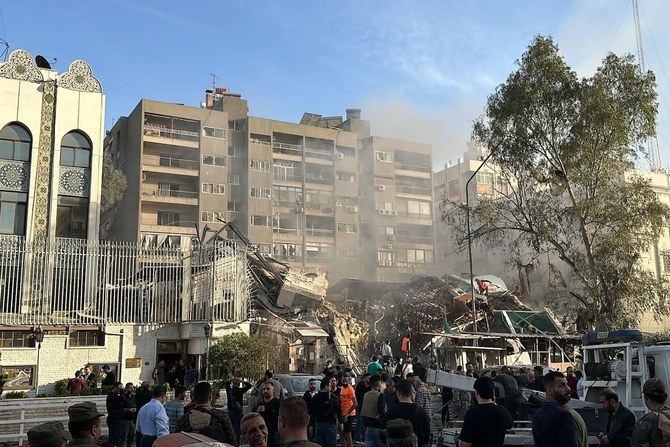
- Iran withdrew its forces from southern Syria, including both Quneitra and Daraa provinces
- Iran has said repeatedly that it has no combat troops in Syria, only officers to provide military advice and training
BEIRUT: Iran has reduced its military footprint in Syria after a succession of strikes blamed on Israel, a source close to Iran-backed militant group Hezbollah and a war monitor said Wednesday.
Iran has provided military support to Syrian government forces through more than a decade of civil war but a series of strikes targeting its commanders in recent months has prompted a reshaping of its presence, the sources said.
“Iran withdrew its forces from southern Syria,” including both Quneitra and Daraa provinces, which abut the Israeli-annexed Golan Heights, the source close to Hezbollah said.
But it still maintains a presence in other parts of the country, the source added.
Recent months have seen a series of strikes on Iranian targets in Syria, widely blamed on Israel, culminating in an April 1 strike that levelled the Iranian consulate in Damascus and killed seven Revolutionary Guards, two of them generals.
That strike prompted Iran to launch a first-ever direct missile and drone attack against Israel on April 13-14 that sent regional tensions spiralling.
But Iran had already begun drawing down its forces after a January 20 strike that killed five Revolutionary Guards in Damascus, including their Syria intelligence chief and his deputy, the source close to Hezbollah said.
Britain-based war monitor, the Syrian Observatory for Human Rights, said Iranian forces had withdrawn from Damascus and southern Syria.
Iran-backed Lebanese and Iraqi fighters had taken their place, Observatory chief Rami Abdel Rahman said.
Iran has said repeatedly that it has no combat troops in Syria, only officers to provide military advice and training.
But the Observatory says as many as 3,000 Iranian military personnel are present in Syria, supported by tens of thousands of Iran-trained fighters from countries including Lebanon, Iraq and Afghanistan.
Abdel Rahman said that many of Iran’s advisers had left Syria over the past six months, although some remained in Aleppo province in the north and in Deir Ezzor province in the east.
Jordan King issues decree to hold parliamentary elections - state TV
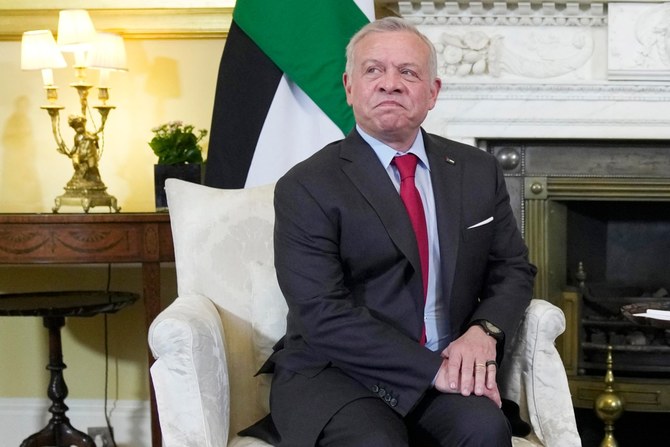
DUBAI: Jordan’s King Abdullah issued a royal decree on Wednesday announcing that a parliamentary election will be held, state TV said.
Under the constitution, the multi-party election is usually held within four months of the end of a four-year term of parliament. The country’s last election, with over 4.6 million eligible voters, was held in November 2020.
An independent election commission decides the exact date.
Iran, Pakistan urge UN Security Council to take action against Israel
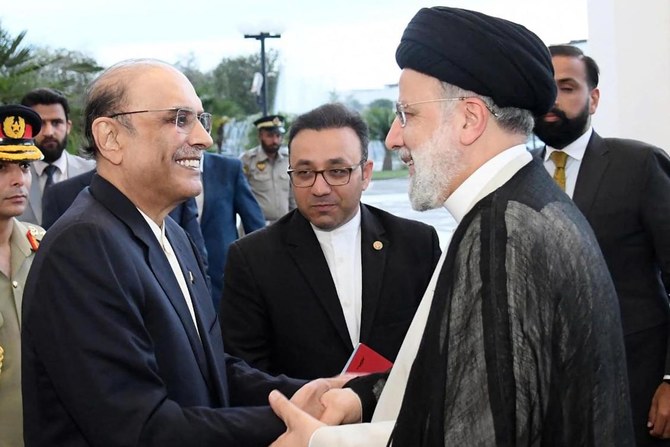
- The joint statement followed a three-day visit to the country by Iranian President Ebrahim Raisi
- Muslim neighbors Iran and Pakistan are seeking to mend ties after unprecedented tit-for-tat military strikes this year
ISLAMABAD: Iran and Pakistan called on the United Nations Security Council in a joint statement issued on Wednesday to take action against Israel, saying it had “illegally” targeted neighboring countries and foreign diplomatic facilities.
The joint statement, released by Pakistan’s foreign ministry, followed a three-day visit to the country by Iranian President Ebrahim Raisi at a time of heightened tensions in the Middle East.
Explosions were heard last Friday over the Iranian city of Isfahan in what sources said was an Israeli attack. However, Tehran played down the incident and said it had no plans for retaliation.
“Recognizing that the irresponsible act of the Israeli regime forces was a major escalation in an already volatile region, both sides called on the UN Security Council to prevent the Israeli regime from its adventurism in the region and its illegal acts attacking its neighbors...,” Iran and Pakistan said in their joint statement.
Muslim neighbors Iran and Pakistan are seeking to mend ties after unprecedented tit-for-tat military strikes this year.
Raisi, who wrapped up his visit and flew on to Sri Lanka on Wednesday, vowed to boost trade between Iran and Pakistan to $10 billion a year.
During his visit to Pakistan, Raisi was quoted by Iran’s official IRNA news agency as saying any further Israeli attack on Iranian territory
could radically change the dynamics and result in there being nothing left of the “Zionist regime.”
On April 13, Tehran launched a barrage of missiles and drones at Israel in what it said was retaliation for Israel’s suspected deadly strike on the Iranian embassy compound in Damascus on April 1, but almost all were shot down.
Pakistan has previously called for de-escalation by “all parties.”
Iran and Pakistan vowed during Raisi’s visit to boost trade and energy cooperation, including on a major gas pipeline deal that has faced delays due to geopolitical issues and international sanctions.
Lebanon’s Hezbollah says fired ‘dozens’ of rockets at Israel
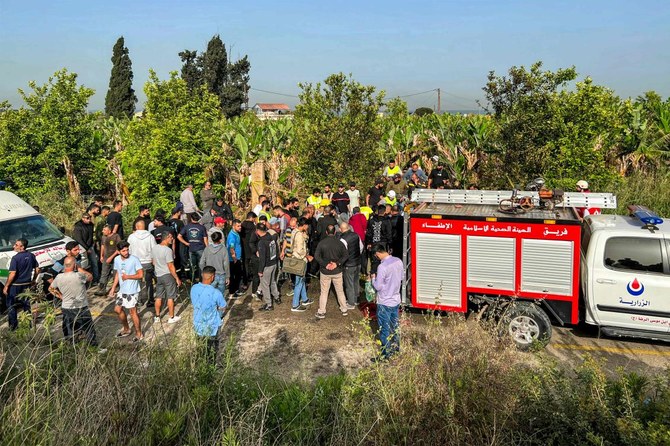
- Hezbollah has exchanged near-daily fire with the Israeli army
- Israel says 11 soldiers and eight civilians have been killed on its side of the border
Beirut: Lebanon’s Iran-backed Hezbollah movement said it fired a fresh barrage of rockets across the border on Wednesday after a strike blamed on Israel killed two civilians.
The group had already fired rockets at northern Israel late on Tuesday “in response” to the civilian deaths.
Hezbollah has exchanged near-daily fire with the Israeli army since its ally Hamas carried out an unprecedented attack on Israel on October 7, triggering war in Gaza.
It has stepped up its rocket fire on Israeli military bases in recent days.
Hezbollah fighters fired “dozens of Katyusha rockets” at a border village in northern Israel “as part of the response to the Israeli enemy’s attacks on... civilian homes,” the group said in a statement.
On Tuesday, rescue teams said an Israeli strike on a house in the southern village of Hanin killed a woman in her fifties and a girl from the same family.
Since October 7, at least 380 people have been killed in Lebanon, mostly Hezbollah fighters but also 72 civilians, according to an AFP tally.
Israel says 11 soldiers and eight civilians have been killed on its side of the border.



